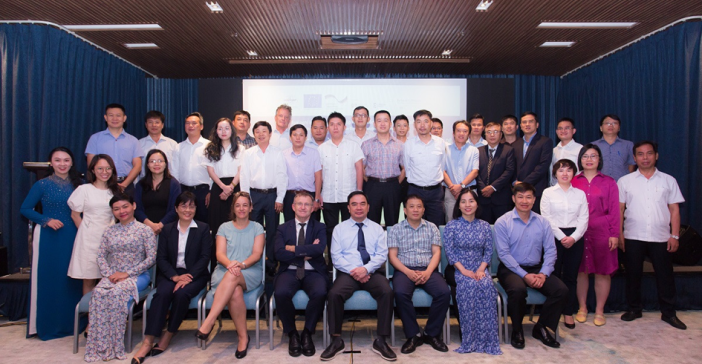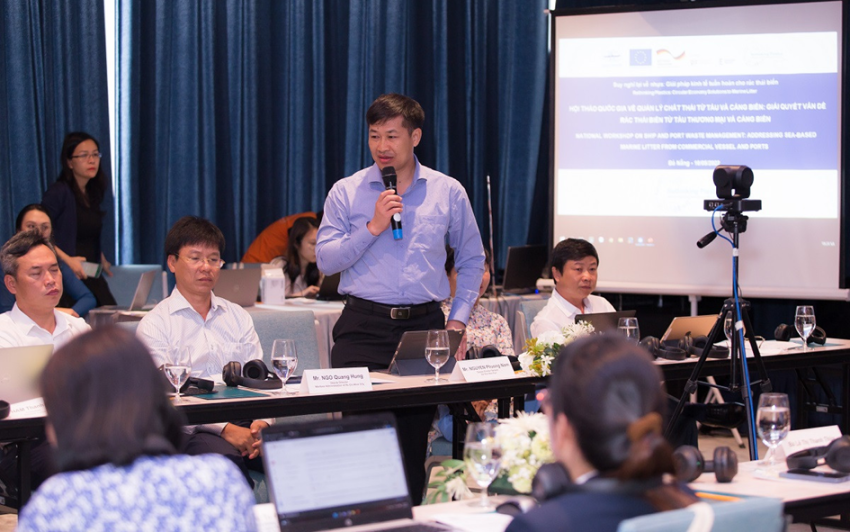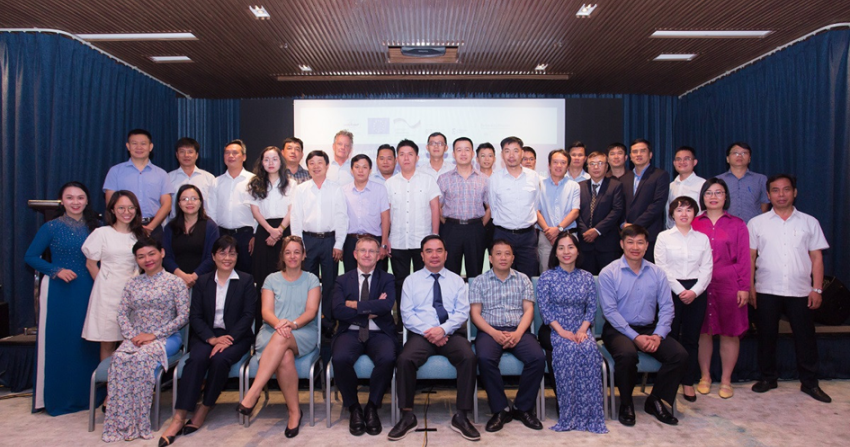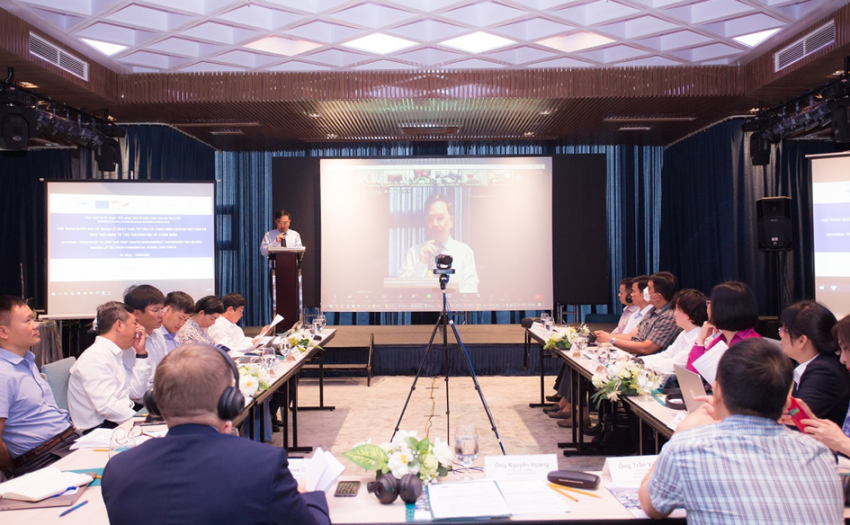Strengthening Ship Waste Management in Vietnam and in the region
The maritime traffic has been increasing worldwide during the last 20 years. This has resulted in a much stronger focus on its environmental impact from Government and NGO ́s, and lately also from the shipping industry.
Improving Ship Waste Management in Vietnamese sea ports: The following video has been produced by the EU-German Government funded ‘Rethinking Plastics – Circular Economy Solutions to Marine Litter’ project in close cooperation with Vinamarine, Hanoi, The Port Authority HCMC and Cat Lai Terminal, New Saigon Port. It highlights the results of the Vietnamese pilot project on improving Ship Waste Management to reduce illegal discharges from ships into the sea and how this will benefit port stakeholders, for examplethrough online waste notification and incentivizing cost recovery systems. The pilot project, conducted between 2020-2022builds on “best practices” from EU ports and the conclusions from the EU Directive 2000/59.
One of the aspects in focus are illegal operational discharges of ship waste especially in coastal areas. Oily waste, garbage, plastic, sewage, and hazardous waste, among others, have a huge negative impact on the marine environment, fishing, and tourism industry with ship maritime waste also contributing to the increasing volume of plastics found in the oceans. "Rethinking Plastics" works on providing solutions in its pilot projects with ports in China, the Philippines, Thailand and Vietnam.
To reduce illegal dumping of ship waste into the sea and to improve its management on land in Vietnamese ports, the Vietnam Maritime Administration (Vinamarine) and the Ministry of Transport (MOT) have cooperated with “Rethinking Plastics” in the past two years. On 16 and 17 May, the partners presented the results of the cooperation on ship waste management and an outlook to further following improvements. Vinamarine and the project co-hosted a national and aregional workshop on “Ship and Port Waste Management: Addressing Sea-based Marine Litter from Commercial Vessel and Ports” with representatives from the Vietnamese Ministry of Transport, Vinamarine, Saigon Newport Corporation, ports authorities in Vietnam, the counterparts from neighbouring ASEAN countries as well as international and national experts.
Between April 2020 and April 2022, the Vietnamese Ministry of Transport, Vinamarine Hanoi and HCMC, and “Rethinking Plastics” implemented the pilot project “Ship Waste Management in Vietnamese ports”, in Cat Lai terminal (Saigon Newport) with the assistance of international and local maritime experts. In Vietnam, ships can deliver their waste to facilities in some ports. However, many ports are facing several challenges in providing efficient ship waste collection services and are not yet equipped with adequate reception facilities or other collection systems for the management of ship wastes and most of them sign contracts with external waste operators, although the national government has developed regulations to encourage the expansion and presence of waste reception facilities at the ports (e.g., Circular 41/2017/TT-BGTVT of the Ministry of Transport, Law on Environmental Protection, 2020). If ships calling at Vietnamese ports cannot deliver their waste at port reception facilities or other collection systems, they are often indirectly forced to dump it illegally into the sea.
During the pilot project in Cat Lai port, the partners assessed the existing system and national legislation, current challenges and options for improving the facilities and have provided several recommendations also including best practices from European ports. The project designed and implemented an online waste notification system, recommended a more incentivizing Cost Recovery System (waste fee) and prepared a description of existing procedures in a Ship Waste Management Manual, which were agreed upon
between relevant partners, among them Vinamarine, Port Authorities, and operators. Mr. Nguyen Hoang, Deputy General Director of Vinamarine, remarked:
“The online waste notification system is now implemented at Vinamarine HCMC and described in the manual for the information to stakeholders. With these improvements, the ports can in the future provide efficient waste handling services to ships and ease the administrative procedures for shipping agents. It is an important step towards more sustainability and contribution to reduce marine litter and Vinamarine will participate in replicating the results of the pilot project to other ports nationwide.”
“The introduction of an incentivizing Cost Recovery System will stimulate waste delivery. Furthermore, implementing the proposed activities will be beneficial not only to the shipping industry but also provide financial and administrative benefits to the port and its stakeholders. This will not only make the port fully compliant with international conventions and national regulations but also serve as an example for other ports in the region. We are glad that we could contribute to this process based on our experiences and
approaches from European ports”, said Mr. Rui Ludovino, First Counsellor at the European Union Delegation to Vietnam.
Mr. Jens Peter Oehlenschlaeger, Key expert on Ship Waste Management of the “Rethinking Plastics” project, explained: “It is vital that the waste collected from ships is managed properly on land and to the extent possible merged into the municipal waste streams according to national regulations regarding further treatment and final disposal. All steps from the collection to treatment and final disposal have to be addressed efficiently. In Europe for example, the introduction of fully or partly indirect waste fees contributed to increasing delivery of waste to EU port reception facilities. A more widespread introduction of indirect fees will without doubt also have a significant positive environmental impact in South East Asia. We had valuable discussions in the past two years, whose results can now be disseminated to other ports in Vietnam and also contribute to strengthening regional cooperation on ship waste management.”
"Rethinking Plastics" follows a same approach in close cooperation with partners and selected ports in China, the Philippines and Thailand.
Cross-border agreements and regional cooperation on ship waste management have been introduced in many parts of the world and could also be relevant for the ASEAN region, said Oehlenschlaeger. He raised during the regional session: “Ships and waste move across borders, and this is why we need regional cooperation on this matter. Pooling resources and expertise will provide a more cost-effective way to address discharges from ships that cannot be dealt with immediately by one country. It can help authorities and ports to implement harmonised measures and ensure a more uniform implementation of such measures.” In addition, promoting stronger ASEAN cooperation would contribute to wider global cooperation on shipping issues that are regulated under the MARPOL convention. Oehlenschlaeger suggested strengthening ASEAN maritime cooperation, which could include the preparation of an ASEAN Ship Waste Management Strategy, involving measures to reduce illegal discharges, utilisation of synergies as well as national and international experience.
Tran Viet Ha, Deputy Director at the International Cooperation Department for the MoT said: “We need global efforts and regional cooperation, so we encourage ASEAN member states to work together.” Vinamarine will send a new proposal via the ASEAN Secretariat, Ha added.
"Rethinking Plastics" has already published a policy brief on Ship Waste Management in Vietnam and a infographic on improving Ship Waste Management. Please find more under "Downloads".









